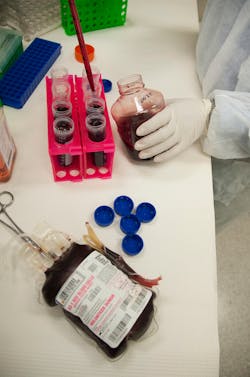bioMérieux receives FDA clearance to extend platelet shelf life to seven days with LVDS
bioMérieux, a world leader in the field of in vitro diagnostics, announced that its BACT/ALERT BPA and BPN culture bottles have received 510(k) clearance from the U.S. Food and Drug Administration (FDA) for Large Volume Delayed Sampling (LVDS) of leukocyte-reduced apheresis platelets (LRAP) and leukocyte-reduced whole blood platelet concentrates (LRWBPC) with BACT/ALERT3D and BACT/ALERT VIRTUO systems.
In September 2019, the FDA released its final guidance regarding “Bacterial Risk Control Strategies for Blood Collection Establishments and Transfusion Services to Enhance the Safety and Availability of Platelets for Transfusion.” This guidance officially recognizes LVDS as an effective strategy to control the risk of bacterial contamination in platelets and extend their shelf life to seven days with a single-step approach. This results in improved safety as well as increased availability of these life-saving products.
Platelets are particularly prone to contamination since they are stored at room temperature. Therefore, routine testing for bacterial contamination is critical to detect those units that are contaminated and could potentially cause harm to transfused patients.
LVDS has already been implemented in several countries as an effective risk reduction measure to increase safety of the platelet supply while eliminating the need for further testing. Recent analyses have suggested that LVDS is a cost-effective approach when compared to other proposed strategies, and that extending platelet shelf life to seven days may reduce unnecessary discarding of platelets.
Patient safety is at the heart of bioMérieux’s innovations to detect specific pathogenic bacteria in platelets in order to enhance their safety and increase their availability.
BACT/ALERT BPA and BPN culture bottles support the growth of aerobic and anaerobic microorganisms in three types of leukocyte reduced platelet units: apheresis platelet units, and both single and pools of up to six units of whole blood platelet concentrates. The BACT/ALERT technology is in routine use by blood collection and transfusion facilities in over 25 countries worldwide and has a proven track record for reliably testing platelets.

